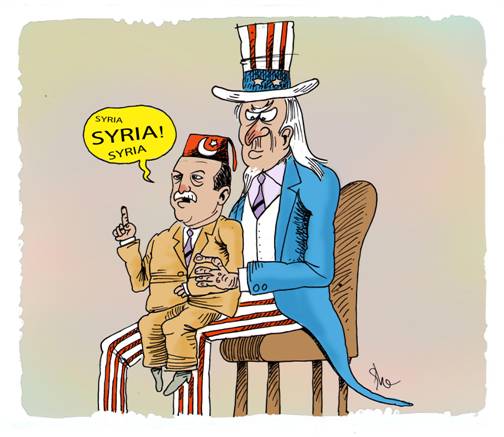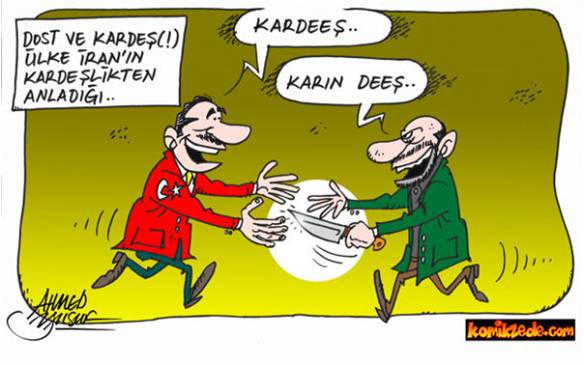TURKEY AND IRAN: FROM AN AMBIVALENT HONEYMOON TO DIVORCE?

Number 55 ● 3 February 2013
TURKEY AND IRAN: FROM AN AMBIVALENT HONEYMOON TO DIVORCE?
Hay Eytan Cohen Yanarocak*
In December 2012, the Turkish media announced the Iranian President Mahmud Ahmedinejad had cancelled a one day visit to Konya to mark the 739th anniversary of the passing of the great Sufi mystic Mevlana Celaleddin Rumi (RFERL, 17 December 2012). On the one hand, this cancelation revealed the tension between the two countries over the dominance in the region, which had been evident ever since Premier Recep Tayyip Erdoğan’s ambitions began to clash with Ahmedinejad’s, especially in the aftermath of the Arab Spring. On the other hand, the bilateral economic relations between Tehran and Ankara may indicate close cooperation despite Western pressure and imposed sanctions against Iran.
Tension and rivalry between Turkey and Iran are not new. Relations between the two countries entered a bitter period following the Islamic Revolution in Iran (1979). Secular, Kemalist Turkey constantly accused Iran of involvement in the death of Kemalist intellectuals, while simultaneously protesting Iran’s desire to export its revolution to Turkey. The PKK (Kurdistan Workers’ Party) has also been an obstacle between the two countries since the PKK launched its extra-territorial raids from neighboring Iran. Ankara’s concerns were explicitly stated in the “National Security Political Document,” popularly known as the Red Book (“Kırmızı Kitap,” published once every five years), which defined Iran as the number one security threat against Turkey for 2005-2010.
Since then, however, the two countries found themselves in an ambivalent honeymoon when the Turkish Armed Forces (Türk Silahlı Kuvvetleri, TSK) lost its dominant power in Turkish politics. The gap was filled by Erdoğan’s Justice and Development Party (Adalet ve Kalkınma Partisi, AKP) and its foreign minister, Ahmet Davutoğlu, who is known to have been the architect of the 2010 Red Book. Contrary to previous editions and according to information that was intentionally leaked to the press, the 2010 Red Book did not define Iran as a security threat, but rather emphasized its cooperation against the Kurdish groups such as PJAK (the Party of Free Life of Kurdistan) and the PKK. Indeed, during the term of Chief of Staff İlker Başbuğ’s (2008-2010) the cooperation between Ankara and Tehran against the PKK and PJAK reached its peak with joint extra-territorial operations in Northern Iraq. Since then, Turkey has tried to advance this cooperation on the diplomatic level. While emphasizing that it did not wish to have a nuclear neighbor, Turkey tried, together with Brazil, to become a mediator between Iran and the West by signing the Tehran Agreement (for the content of the agreement see The-Guardian, 17 May 2010). According to this agreement, Turkey would act as an interim transfer station for replacing Iranianuranium in nuclear fuel. Turkey’s pro-Iranian stance continued throughout 2010 when it voted against the UN Security Council’s economic sanctions against Iran.
Despite the improvement in relations and growing economic cooperation between Iran and Turkey, other strategic interests as well as their ambitions for regional hegemony continue to feed tensions between Ankara and Tehran. Iran gained immense popularity in the Arab world because of its supportfor the Hamas, and steadfastness against the Western pressure concerning its nuclear program. It was not until Premier Erdoğan’s Davos outburst against Israeli president, Shimon Peres, during a panel discussion on Gaza at the World Economic Forum in January 2009; Iran's post-election crackdown on protesters (June 2009), and the launch of the Mavi Marmara flotilla in May 2010 that Turkey superseded Iran’s popularity in the Arab street. Ankara made its stance even clearer after the flotilla episode and began to act as patron of the Hamas, and assisted it in the ceasefire talks during Israel’s 'Operation Pillar of Defense' in Gaza (See Iran Pulse no. 53).
Moreover, the struggle over the domination of Iraq after the US withdrawal and the Arab Spring of 2011 seem to have put an end to the ambivalent honeymoon of Iran and Turkey. In Iraq, Iran strengthened the Shi’i Dawa Party leader, Prime Minister Nouri al-Maliki, while Turkey favored Iyad Allawi of the secular Pan-Iraqi Movement. In order to strengthen its position in Iraq, Turkey also formed a new entente with the Kurdistan Regional Government (KRG), which was previously perceived as a national security threat. As a result, the Iran-backed al-Maliki continually accused Erdoğan of interfering in Iraq’s internal affairs, and criticized oil and business agreements that were signed between the KRG and Turkey (CNNTURK,a12 August 2012). These agreements opened Iraq up to 1023 Turkish firms. Premier Erdoğan tried to improve Turkey’s relationship with the Shi’i population of Iraq, and in March 2011 he became the first ever Sunni leader to visit Ali’s tomb in the holy city of Najaf. It was no coincidence that Turkish Airlines launched its first flights to Najaf the same year. Nonetheless, Turkey granted the right of asylum to the Sunni leader Tariq al-Hashimi, who al-Maliki’s administration accused of being involved in terrorist activities, and this caused another rift between Iranian-backed Baghdad and Ankara.
The Arab Spring and, especially, the situation in Syria became a critical problem between the two countries as well. After the successful revolutions in Tunisia, Egypt and Libya, Turkey adopted a critical stance towards Assad’s Iran-backed regime in Syria by calling on a need for reforms. The tension reached its peak when a Turkish reconnaissance jet was shot down, and a mortar killed five Turkish citizens in the border town of Akçakale. After these incidents, Turkey began to actively support the “Free Syrian Army” which clashed with Assad’s forces, reportedly backed by the Iranian Revolutionary Guard Corps (IRGC). The Turkish newspaper Hürriyet quoted a critical analysis of Turkey’s policy toward Syria published by Iranian Mehr News Agency, which accused Turkey of serving Western and Israeli interests by adopting “American Islam” instead of Khomeini’s real Islam (Hürriyet, 25 December 2012).

An Iranian perspective: cartoon by Shahin Kalantary (mashreghnews.ir 10 October 2012)
An additional core problem between Iran and Turkey arose following the establishment of a NATO early warning radar in Malatya Kürecik and the deployment of Patriot missiles into Turkey. While Turkey advocates a NATO presence due to a chemical threat from Syria, Iranians consider NATO’s presence in Turkey a threat to their national security vis-a-vis their problems with Israel and concerning interests in Syria. Iranian senior officials’ statements also underline Iranian discontent. In a press conference, Amir Ali Hajizadeh,Commander of the IRGC Aerospace Force, explicitly declared Turkey a legitimate target if Iran were attacked by NATO (RFI, 27 November 2011). The following year, Iranian Chief of Staff General Hasan Firouzabadi went one step further and accused Turkey of triggering a world war among nations (Radio Zamaneh, 16 December 2012). Knowing that Tehran feels threatened by a NATO presence, Ankara accused Iran and Syria of supporting the PKK’s activities in Turkey, which lead to a drastic increase in the death toll, exceeding 700 Turks in 2012, compared to 150 in 2011.
 A Turkish perspective: for Iran brotherhood means sticking a knife in the belly. A cartoon by Ahmed Yusuf (komikzede.com, 12 August 2012)
A Turkish perspective: for Iran brotherhood means sticking a knife in the belly. A cartoon by Ahmed Yusuf (komikzede.com, 12 August 2012)
Despite these differences and the historic rivalry between the two countries, Turkey and Iran continue to cooperate in many other sectors. Energy is one of the most prominent examples of their cooperation. Following the EU oil sanctions against Iran, Turkish Energy Minister Taner Yıldız openly declared that Turkey will remain indifferent to the EU sanctions and continue to import oil becuase Iran provides 45% of the country’s oil needs (Press TV, 7 January 2013). Moreover, Turkey is accused by the West for acting as a subcontractor for the Iranian companies to help them bypass the international sanctions. The cooperation between the two countries is also apparent when noting the increasing export-import statistics. According to Turkish Ministry of Economy, Turkish exports to Iran increased dramatically in 2012, by approximately 300% (see the website of the Turkish Ministry of Economy). Despite the huge increase, Iranians still profiting more from the export-import balance between the two countries. There is also a mutual win-win situation in tourism. According to Turkish tourism statistics, Iran was ranked in the 6th place among the top countries that sent tourists to Turkey in 2012 (see the website of the Turkish Ministry of Culture and Tourism).
In spite of vital disagreements on core regional issues, Iran and Turkey do share foreign policy views as well as common economic interests, for example: calming the potential Lebanese civil war crisis of 2011, and supporting Hamas. However, the historical rivalry may have put an end to the ambivalent honeymoon and opened a deeper rift between the two countries. Only time will tell if Iran is capable of forming a Shi'i crescent from Iran to Lebanon via Iraq and Syria, or if Turkey can strengthen the Sunni dominance by toppling Assad and consolidating its position in Iraq through Kurdish and Sunni groups■
*Hay Eytan Cohen Yanarocak ( hayeytan@post.tau.ac.il) is a doctoral candidate at the Graduate School of History in Middle Eastern and African Studies at Tel Aviv University. He is a junior research fellow at the Moshe Dayan Center for Middle Eastern and African Studies.
T h e A l l i a n c e C e n t e r f o r I r a n i a n S t u d i e s ( A C I S )
Tel Aviv University, Ramat-Aviv 61390, Tel Aviv P.O.B. 39040, Israel
Email: IranCen@post.tau.ac.il, Phone: +972-3-640-9510
F a x : + 9 7 2 - 3 - 6 4 0 - 6 6 6 5
Iran Pulse No. 55 ● 3 February 2013
© All rights reserved


